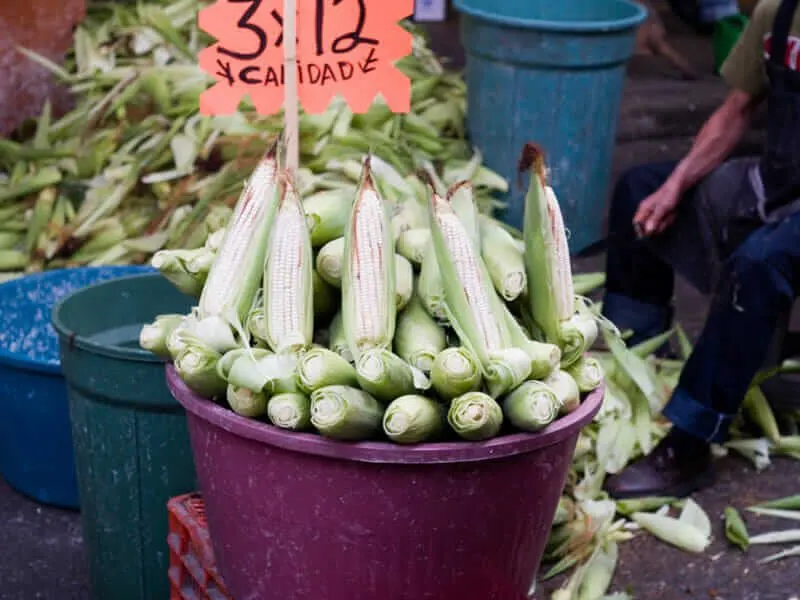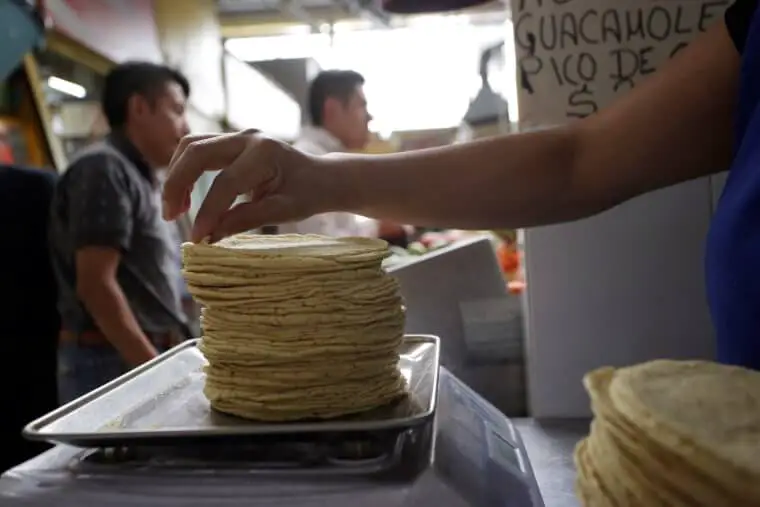Farmers warn Mexico’s GM corn ban will raise food prices
Farmers warn Mexico’s GM corn ban will raise food prices


The Mexican government led by Andres Manuel Lopez Obrador (AMLO) has carried out a battle against scientific innovation in the country’s farm fields over the three years of his administration, attacking biotechnological crops and agricultural supplies. Earlier this year, AMLO enacted a decree to phase out the use of the herbicide glyphosate and the cultivation of GM corn, as well as GM corn imports, by 2024, arguing both products present health risks. He contends that boosting traditional corn supplies domestically should be prioritized.

The prohibitions on GM corn have profound implications, according to the Institute for Agriculture & Trade Policy. The immediate ban on permits for the cultivation of GM corn formalizes current restrictions ordered by Mexican courts in 2013, while the import ban is presented as part of the Lopez-Obrador administration’s goals of promoting greater food self-sufficiency in corn.
Some environmental organizations quickly praised the decree, celebrating it as the first step in Mexico achieving self-sufficiency. But while Greenpeace Mexico declared that “these are important steps in moving forward ecological production that preserves biodiversity and agrobiodiversity,” farmers were worried. They decided to push back and move the debate from their fields to the courts.
Farmers fight back
Just a few weeks after the decree was enacted, the farmers’ associations began issuing statements declaring their disapproval of the President’s unilateral decision. Jose Cacho, president of Mexico’s corn industry chamber CANAMI, said the GMO corn ban is unworkable due to the supply chains that for years have developed around them. “This decree is completely divorced from reality,” he said.
Additionally, Juan Cortina, president of the National Farm Council (CNA), declared that lawsuits are needed to get the government to back down. “Unfortunately, I think there will need to be legal challenges brought by all people who use glyphosate and genetically modified corn,” Cortina told Reuters. He also urged policy makers to make decisions “based in science, not on ideology.”
The CNA has been particularly outspoken about its opposition, pursuing legal action to prevent the federal government from enacting the ban on GM corn and glyphosate. However, a Mexican federal judge recently ruled against the request to freeze the decree.
The CNA said it regretted its legal loss, and warned that if the bans go into effect, food prices will jump and farmers will become less productive. The CNA said it is most concerned that “radical and unscientific interpretations” of the planned bans will stoke uncertainty.
Farmers and consumers will pay the price
Mexico is the biggest foreign market for yellow corn grown in the United States, nearly all of which is genetically modified. Mexico imported 18 million tons of GM corn last season, or around 40 percent of its national consumption. Denying this source of corn just because is GM would make it nearly impossible for Mexico to satisfy its demand. Additionally, it would dramatically upend the current grains trade between the two countries.
In a press release, the CNA emphasized that the decree will severely affect Mexico’s food production systems. More importantly, it could harm Mexican families by raising the price of fundamental foods and significantly reducing yields obtained by Mexican farmers who will lose important tools for weed and pest control.
Corn is an essential crop for Mexicans and prohibiting the use and import of GM maize will eventually cause a shortage of human and livestock food, and subsequently a food crisis, where families with low incomes may not be able to afford high priced corn. Farmers will lose market competitiveness if they are denied the use of GM corn and can only grow varieties obtained by ancestral and conventional breeding methods.
The situation and related uncertainty about the possible lack of corn is already impacting consumers. Local newspapers reported that buying tortillas is already a luxury, with this important food source registering its highest increase. The Consultant Group of Agricultural Markets in Mexico reported the increase was due to a 31.6 percent hike in the price per ton of white corn.

Few options to glyphosate
The same decree also calls for a ban on the herbicide glyphosate, which is used by thousands of small and big farms in Mexico to boost crop yields. Since late 2019, the environmental ministry has stopped all permit approvals for glyphosate imports. It’s estimated that its prohibition will reduce yields by at least 30 percent, which would likely make the country even more dependent on imports.
To date, there is not any product available in Mexico to replace the use of glyphosate, with the same characteristics of low toxicity and affordable price.
Mexico’s National Council on Science and Technology (CONACYT) is tasked by the President’s order with identifying a substitute for glyphosate. But so far, the only alternative was presented by the President himself. In a press conference, he proposed substituting glyphosate with machetes. But this low-tech approach would increase the physical labor of farmers and condemn women and children to weeding in the fields all day.
Glyphosate-based herbicides have, in many cases, replaced the widespread use of other herbicides that are more toxicologically problematic and persistent in the environment, such as triazines. Alternatives to glyphosate, such as manual brushing or the use of pressurized steam. have proven to be ineffective or dangerous, such as the acid used in some regions. But above all, they’re very expensive, according to a report by JM Mulet in a national newspaper. Some regions, such as Seville, Spain, that banned glyphosate have chosen to revoke the ban and use it again due to the lack of viable alternatives.
Luis Ventura is a biologist with expertise in biotechnology, biosafety and science communication, born and raised in a small town near Mexico City. He is a Plant Genetic Resources International Platform Fellow at the Swedish University of Agricultural Sciences. Follow him on Twitter @luisventura
A version of this article was originally posted at the Cornell Alliance for Science and has been reposted here with permission. The Cornell Alliance for Science can be found on Twitter @ScienceAlly

 | Videos | More... |

Video: Nuclear energy will destroy us? Global warming is an existential threat? Chemicals are massacring bees? Donate to the Green Industrial Complex!
 | Bees & Pollinators | More... |

GLP podcast: Science journalism is a mess. Here’s how to fix it

Mosquito massacre: Can we safely tackle malaria with a CRISPR gene drive?

Are we facing an ‘Insect Apocalypse’ caused by ‘intensive, industrial’ farming and agricultural chemicals? The media say yes; Science says ‘no’
 | Infographics | More... |

Infographic: Global regulatory and health research agencies on whether glyphosate causes cancer
 | GMO FAQs | More... |

Why is there controversy over GMO foods but not GMO drugs?

How are GMOs labeled around the world?

How does genetic engineering differ from conventional breeding?
 | GLP Profiles | More... |

Alex Jones: Right-wing conspiracy theorist stokes fear of GMOs, pesticides to sell ‘health supplements’




 Trust issues: What happens when therapists use ChatGPT?
Trust issues: What happens when therapists use ChatGPT? Fighting deforestation with CO2: Biotechnology breakthrough creates sustainable palm oil alternative for cosmetics
Fighting deforestation with CO2: Biotechnology breakthrough creates sustainable palm oil alternative for cosmetics Viewpoint — Fact checking MAHA mythmakers: How wellness influencers and RFK, Jr. undermine American science and health
Viewpoint — Fact checking MAHA mythmakers: How wellness influencers and RFK, Jr. undermine American science and health Viewpoint: Video — Big Solar is gobbling up productive agricultural land and hurting farmers yet providing little energy or sustainabilty gains
Viewpoint: Video — Big Solar is gobbling up productive agricultural land and hurting farmers yet providing little energy or sustainabilty gains California, Washington, Oregon forge immunization alliance to safeguard vaccine access against federal undermining
California, Washington, Oregon forge immunization alliance to safeguard vaccine access against federal undermining 30-year-old tomato line shows genetic resistance to devastating virus
30-year-old tomato line shows genetic resistance to devastating virus The free-range chicken dilemma: Better for birds, but with substantial costs
The free-range chicken dilemma: Better for birds, but with substantial costs ‘You have to treat the brain first’: Rethinking chronic pain with Sanjay Gupta
‘You have to treat the brain first’: Rethinking chronic pain with Sanjay Gupta
